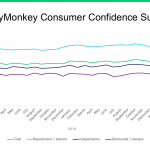April Summary
More than four in ten people (43 percent) who’ve already filed their 2018 tax returns aren’t sure whether they got a tax cut as a result of the December 2017 tax law (20 percent lean towards thinking they did, and 24 percent lean towards thinking they didn’t). Nearly a quarter (24 percent) say they definitely got a tax cut, and 31 percent say they definitely didn’t.
Though still high, consumer confidence ticked down from 61 to 60 this month, a reflection of stagnating sentiment across all five component measures.
Methodology: This SurveyMonkey online poll was conducted April 1-7, 2019 among a national sample of 9,716 adults. Respondents for this survey were selected from the more than 2 million people who take surveys on the SurveyMonkey platform each day. The modeled error estimate for this survey is plus or minus 1.5 percentage points. Data have been weighted for age, race, sex, education, and geography using the Census Bureau’s American Community Survey to reflect the demographic composition of the United States age 18 and over.

Topline Archive
Media Coverage
March Summary
Relatively few people (22 percent) report getting a bigger tax refund than they did last year, with more saying they received a smaller refund (32 percent) or a refund that was about the same as their 2017 refund (34 percent). Just 11 percent of people say they owed money after filing their 2018 tax return.
Consumer confidence holds at 61 this month, with a one-point tick down among Republicans (81 to 80) offset by a one-point tick up among Democrats (42 to 43). Index scores were highest among those who said they definitely got a tax cut and those who got a bigger tax refund than in previous years. Republicans continue to have exceptionally high index scores compared to both Democrats and independents, and they are the group most likely to say they received a tax cut and a bigger than usual refund.
January Summary
Year over year, optimism in the economy has fallen. In our results from January of last year, nearly twice as many people (42% vs. 23%) said the economy was better off then than it was the year prior. Today, that 19 percentage point gap has narrowed to just seven, with 38% of people saying the economy is better off and 31% saying it is worse off.
The consumer confidence index also got a glum start to 2019, with the index value dropping two points to a score of 57, its lowest point since December 2017. Year over year, the confidence index slid three points down.
October Summary
With gains among men and women, Republicans and Democrats, old and young, consumer confidence reached a new high of 62 this month.
Four of the five index components also reached new high marks this month:
- 54 percent of people expect the country to experience continuous good times economically in the next five years
- 46 percent expect business conditions to be good in the next year
- 44 percent expect themselves to be better off financially a year from now
- 38 percent are better off now than they were a year ago
September Summary
Consumer confidence again ticked up to 60 this month, making September the fifth month this year it’s hit that record high.
Three of the five index components are also at or exceeding their previous high marks:
- 38 percent of people say now is a good time to make big purchases, topping the previous high of 37 percent from July of this year
- 43 percent of people expect business conditions to be good nationwide in the next year, matching the high only seen before in January
- 36 percent of people say they are better off now than they were a year ago, matching the high only seen previously in June
August Summary
Consumer confidence notches back up to 59 this month, with only small changes among all index components. Opinions on tariffs and the tax law are stable as well.
Few people separate their own financial situations from those of the country as a whole. More than seven in 10 people (71 percent) who expect to be better off financially a year from now say that business conditions for the country will also fare well in the next 12 months. Nearly as many (63 percent) of those who expect to be in worse shape financially a year from now say that business conditions will be worse, too.
July Summary
Consumer confidence among Republicans matches its highest-ever value of 82 (previously seen in February), while confidence among Democrats matches its lowest-ever value of 39 (previously seen in December). This is the widest partisan gap in confidence we have yet seen. Overall, our July consumer confidence value falls back to its April level of 58.
June Summary
Consumer confidence returns to its previous high of 60 in June, meaning four of the first six months this year are now tied for the all-time high index value.



